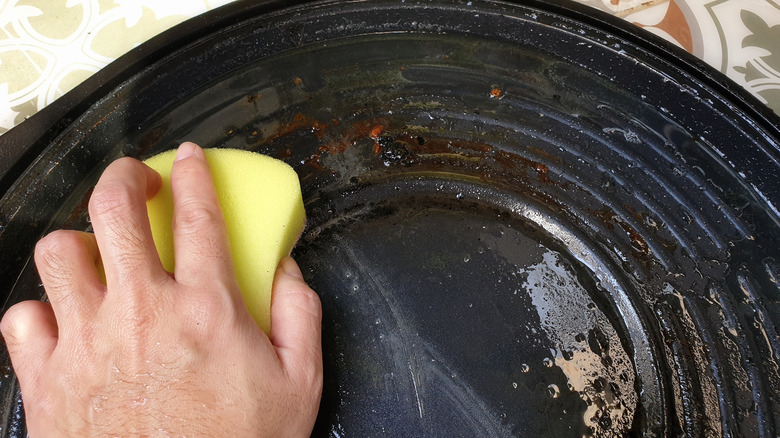You Should Break These Cast Iron Rules, According To Alton Brown And Alex Guarnaschelli
A cast iron skillet is a great tool. That's why a tweet from Alton Brown, the veteran show host of "Good Eats," recently gained some attention. Hopefully, it will set the record straight once and for all on the controversial issue of how to care for your cast iron pan. The verdict? Wash it!
Brown's tweet read: "#CulinaryTruth you can wash your cast iron skillet with actual soap. You can cook tomatoes in it. You can toss it in a volcano. #itdoesntcare #notsureaboutvolcanopart" (via Twitter). Alex Guarnaschelli of "Iron Chef" and "Chopped" fame retweeted Brown's statement with a simple: "Yes."
Brown's tweet asks why we ever question the resilience of cast iron. What made us believe that we had to be so careful with our iron cookware? According to the Kitchn, the myth casting soap as the mortal enemy of cast iron is based on two theories: that because oil "seasons" the skillet (makes the surface non-stick), soap would effectively wash away the oil and "unseason" the pan. The second myth is that soap doesn't effectively clean cast iron. Both are just that: myths.
The Kitchn points out that it's not the oil itself, but a process called polymerization, that is responsible for the non-stick effect of a well-seasoned pan. That is, when heated, the oil reacts to the porous surface of the pan, creating the hard, smooth, non-stick surface, and this barrier cannot be washed away with soap and water.
Tomatoes are fine, with one catch
As for the myth that you can't cook tomatoes in a cast iron skillet? This idea stems from the fact that highly acidic foods can break down the metal of a cast iron skillet. It's true that acidic foods like wine and tomatoes can loosen the metal, allowing a very small amount of it to be released into the food. While not dangerous, this process can impart a metallic taste to the food you're cooking. America's Test Kitchen experimented, cooking a highly acidic tomato sauce to test this theory. They found that a metallic flavor was detectable in their tomato sauce, but only after a half-hour of cooking. The upshot: you can cook tomatoes and other acidic foods in a cast iron skillet, just be careful not to cook them too long, and make sure your pan is well-seasoned.
To keep maintain your pan's non-stick surface, cast iron cookware manufacturer Lodge Cast Iron recommends occasionally reseasoning your skillet: After washing and thoroughly drying your pan, rub a small amount of cooking oil into the pan's surface, both inside and out, using a lint-free cloth or paper towel. Bake the pan upside down on the center rack in a preheated 350–450 F oven for one hour. (Place foil on the bottom rack to catch oil drips.)
The takeaway, as @CastIronStarr responded to Alex Guarnaschelli's retweet: "It's not the 1860's. Wash your cookware."

